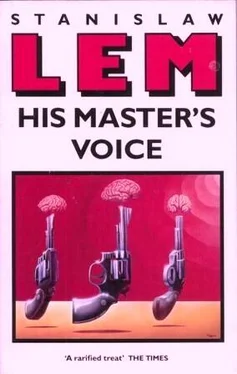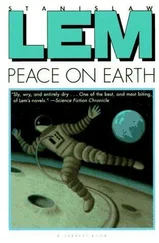Mathematics for me was no Arcadia; it was, rather, a court of last resort, a church that I entered, unbelieving, because it offered sanctuary. My principal metamathematical work has been called destructive, and not without reason. It was no accident that I called into question, irreversibly, the foundations of mathematical deduction and the concept of the analytic in logic. I turned the tools of statistics against these basic notions — until at last they crumbled. I could not be a devil underground and an angel in the light of day. I created, yes, but on ruins, and Yowitt is right: I took away more truths than I ever gave.
For this negative balance the epoch was held to account, not I; because I had followed in the steps of Russell and Gödel — after the former had discovered the cracks in the foundation of the Crystal Palace, and after the latter had shaken it. It was said that I had acted in the spirit of the time. Well, of course. But an emerald triangle does not cease to be an emerald triangle when it becomes a human eye in an arranged mosaic.
More than once I have wondered what would have become of me had I been born within any one of the four thousand cultures we call primitive, which preceded ours in that gulf of eighty thousand years that our lack of imagination contracts to the foreground, the foyer, of history proper. In some of them I would no doubt have languished; but in others, who knows, I might have found greater personal fulfillment, as one visited, as one creating new rites, new magic, thanks to the talent I brought into the world, that of combining elements. Perhaps, in the absence of a restraining curb, which in our culture is the relativism of every conceptual entity, I could have consecrated, with no trouble, orgies of havoc and debauchery, because in those ancient societies they practiced the custom of a temporary, periodic suspension of daily law, by dissolving their culture (it was the bedrock, the Constant, the Absolute of their lives, and yet, remarkably, they knew that even the Absolute required holes!) in order to give vent to the festering mass of excesses that could not be fitted into any codified system, and of which only a portion found expression in war masks and family masquerades, under the bit and bridle of morality.
They were sensible, rational, those severings of societal bonds and rules, the group madness, the pandemonium liberated, heightened by the narcotics of rhythm and poison. It was the opening of a safety valve, out of which poured the factor of destruction; through this particular invention barbarity was adapted to man. But the principle of a crime from which one could retire, of a reversible madness, of gaps rhythmically repeated in the social fabric, has been done away with, and now all those forces must go in harness, work treadmills, play roles that are too tight for them and always ill-suited. So they corrode everything quotidian; they hide in every place; for nowhere is it permitted them to emerge from anonymity. Each of us is, from childhood, fastened to some publicly allowed piece of himself, the part that was selected and schooled, and that has gained the consensus omnium ; and now he cultivates that fragment, polishes it, perfects it, breathes on it alone, that it may develop as well as possible; and each of us, being a part, pretends to be a whole-like a stump that claims it is a limb.
As far back as I can remember, no ethics ever took root in my sensitivity. Cold-bloodedly I built myself an artificial ethics. But I needed to find a reason to do this, because setting up rules in a desert is like taking Communion without faith. I am not saying that I planned out my life in as theoretical a manner as I present it here. Nor did I attach axioms to my behavior retroactively. I proceeded always in the same way, at first unawares; the motivations I later guessed.
Had I considered myself a person who was basically good, I would have been quite unable to understand evil. I would have believed that people perpetrated it always with premeditation — that is, that they did what they had resolved to do — because I would have found no other source of vileness within my personal experience. But I had better knowledge; I was aware of my own inclinations, as well as of my blamelessness for them — blamelessness because I was, after all, the way I was to begin with, and no one had ever consulted me in the matter.
Now, for one slave to strangle another slave to satisfy the forces implanted in both; for one blamelessness to torture another if there existed any chance whatever to resist such a compulsion — to me this was an offense against reason. We are given to ourselves and it is fruitless for us to question what is given, but if there should open up the minutest chance to oppose the Way Things Are — how can one not seize it? Only such decisions and such actions are our exclusive human property, as is the possibility, also, of suicide. This is the sector of freedom where our unasked-for inheritance meets with contempt.
Please do not tell me I contradict myself — the self who saw in the Stone Age a time of dreams come true. Knowledge is irreversible; one cannot go back into the darkness of sweet ignorance. In that time I would have had no knowledge and would have been unable to obtain it. One must make use of the knowledge one possesses. I know that Chance fashioned us, put us together as we are — and what, am I to follow submissively all the directives drawn blindly in that endless lottery?
My principium humanitatis is curious in that if someone basically good wished to apply it to himself, he would be obliged — in keeping with the policy of “conquering one’s own nature” — to do evil in order to affirm his human freedom. My doctrine therefore is not suited for general application; but I do not see why I have to provide humanity with an ethical panacea. Diversity, heterogeneity, is a given in mankind; thus Kant’s declaration that the basis of individual actions could be made a general law means a varying violence done to people; in sacrificing the individual for a superior value — the culture — Kant dispenses injustice. But I am not saying that one is a man only to the extent that he is a self-chained monster. I have presented a purely private argument, my own strategy, which, however, has changed nothing in me. To this day my first reaction, upon hearing of someone’s misfortune, is a spark of pleasure, and I no longer even attempt to stifle such twitches, because I know that I cannot reach the place where that mindless chuckle lives. But I respond with resistance and act contrary to myself, for the reason that I am able to do so.
Had I truly intended to write my own biography — which would have turned out to be, in comparison with the volumes on my shelf, an anti biography — there would have been no need for me to justify these confessions. But my object is different. The adventure I am to relate boils down to this: humanity came upon a thing that beings belonging to another race had sent out into the darkness of the stars. A situation, the first of its kind in history, important enough, one would think, to merit the divulging, in greater detail than convention allows, of who it was, exactly, who represented our side in that encounter. All the more since neither my genius nor my mathematics alone sufficed to prevent it from bearing poison fruit.
The Master’s Voice Project has an enormous literature, more extensive and diverse than ever had the Manhattan Project. Upon its public disclosure, America and the world were inundated with articles, treatises, and essays, so numerous that the bibliography alone is a tremendous tome, as thick as an encyclopedia. The official version is the Baloyne Report, which the American Library later published in ten million copies; but the essence of it appears in the eighth volume of the Encyclopedia Americana. And there have been books about the Project by others who held high positions in it, such as Rappaport’s The First Interstellar Communication, Dill’s Inside His Master’s Voice, or Prothero’s HMV: The Implications for Physics. This last work, authored by my late friend, is among the most accurate, though it really belongs more to the professional literature — professional meaning that the thing studied is clearly separated from the one who studies it.
Читать дальше












